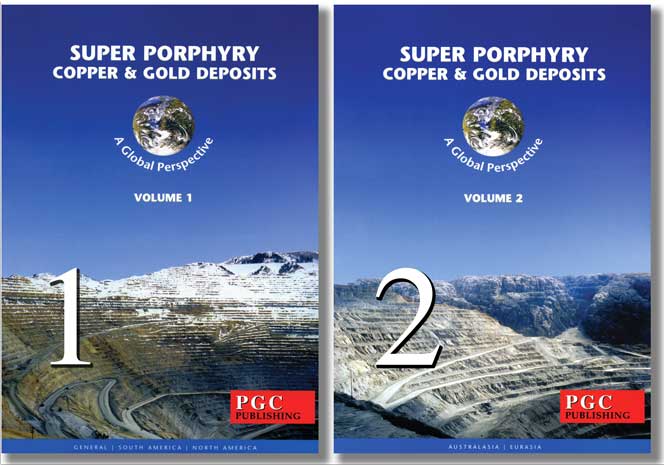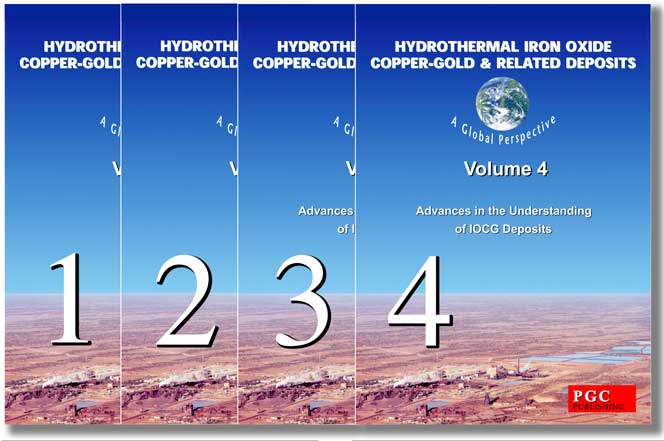|
Wirralie |
|
|
Queensland, Qld, Australia |
| Main commodities:
Au
|
|
 |
|
 |
 |
Super Porphyry Cu and Au


|
IOCG Deposits - 70 papers

|
All papers now Open Access.
Available as Full Text for direct download or on request. |
|
 |
Wirralie is a Carboniferous, low sulphidation, epithermal gold deposit within the north-eastern potion of the Devonian-Carboniferous Drummond Basin, in north Queensland, Australia. It is 210 km SSE of Townsville and 40 km north of Mt Coolon.
Wirralie is hosted by the late Devonian Mount Wyatt Formation which lies between the early to middle Devonian Anakie Inlier basement and the overlying late Carboniferous Bulgonnuna Volcanics. Deposition in the Drummond Basin (which was mainly contintental) took place in 3 cycles. Wirralie is associated with volcanism of the first cycle, while the Pajingo epithermals, 100 km to the NW belong to the third. The region is largely covered by flat lying Tertiary sediments and had undergone deep lateritic weathering, although much of that profile has been removed and only remnants remain.
Locally the host Mt Wyatt Formation is epiclastics with subordinate interbedded lapilli and crystal tuffs and contain variable carbonaceous material. Economic gold occurs as a tabular body generally conformable with the host rocks, dipping NW at around 25° and occurs within an area of 350 x 125 m from the surface to the base of weathering at 40 m.
Mineralisation is associated with a network of quartz-chalcedony veins and quartz matrix breccia veins of at least four generations. These veins are from several mm to several metres in thickness and have breccias of angular silicified wall rocks in a quartz matrix adjacent to some of the thicker veins. In the oxidised zone, argentiferous gold occurs in hematite and goethite along quartz vein boundaries. Below the base of weathering gold persists as a zone of silicification, quartz and quartz-matrix breccia veining, with fine grained pyrite disseminations and veins. In the central higher grade gold (> 5 g/t) zone there is up to 4 to 5% sulphide, dropping off to 2% in the adjacent 1 to 5 g/t Au fringes. Pyrite is the predominant sulphide. Associated alteration includes zoned celadonite, white clay, iron carbonates and calcite below the higher grade sulphides.
Pre-mining reserves were - 3.65 Mt @ 2.75 g/t Au (at a 1 g/t Au cut-off) with an open cut waste:ore ratio of 1.2:1.
For detail consult the reference(s) listed below.
The most recent source geological information used to prepare this decription was dated: 1990.
This description is a summary from published sources, the chief of which are listed below.
© Copyright Porter GeoConsultancy Pty Ltd. Unauthorised copying, reproduction, storage or dissemination prohibited.
|
|
|
|
|
Fellows M L, Hammond J M 1990 - Wirralie Gold deposit: in Hughes F E (Ed.), 1990 Geology of the Mineral Deposits of Australia & Papua New Guinea The AusIMM, Melbourne Mono 14, v2 pp 1489-1492
|
Seed M J, Ruxton P A 1998 - Wirralie gold deposit: in Berkman D A, Mackenzie D H (Ed.s), 1998 Geology of Australian & Papua New Guinean Mineral Deposits The AusIMM, Melbourne Mono 22 pp 691-194
|
|
Porter GeoConsultancy Pty Ltd (PorterGeo) provides access to this database at no charge. It is largely based on scientific papers and reports in the public domain, and was current when the sources consulted were published. While PorterGeo endeavour to ensure the information was accurate at the time of compilation and subsequent updating, PorterGeo, its employees and servants: i). do not warrant, or make any representation regarding the use, or results of the use of the information contained herein as to its correctness, accuracy, currency, or otherwise; and ii). expressly disclaim all liability or responsibility to any person using the information or conclusions contained herein.
|
Top | Search Again | PGC Home | Terms & Conditions
|
|